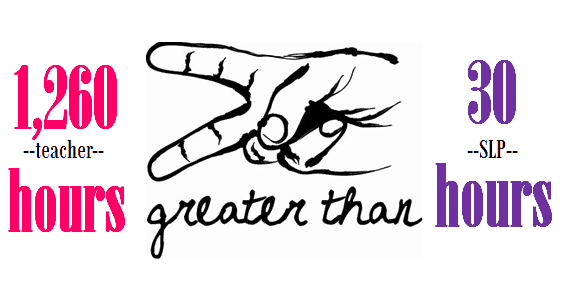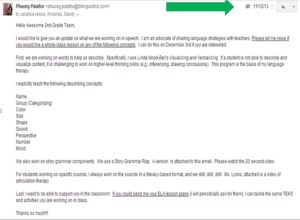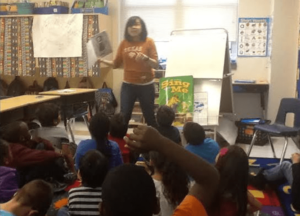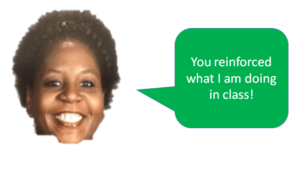In our fourth installment of this series, I want to share a secret I have for making my SLP-life easier.
I interact with teachers!
Sure, I gabbed with teachers when I was a school-based SLP. You know what? I still talk to teachers as a clinic-based SLP. Sometimes, it’s face-to-face. Other times, I talk to teachers through email, text, Skype.
In our last three posts, we talked how to be a more effective, efficient and happier SLP by making your efforts more cumulative, doing intensive speech therapy and using great speech therapy materials.
Why is it important to interact with teachers?

Here’s the thing–SLPs typically spend about 30 contact hours with a client or student within a year. When we add up our 30-minutes-twice-a-week (don’t even get me started on service delivery models!), it adds up to less than 50 hours within 365 days. Now, let’s think about the 1,260 contact hours teachers have with students during the school year. I am not a math expert, but….
4 ways to maximize our time with teachers
- Easily request lesson plans: Many teachers have to automatically submit their lesson plan for the week to a team lead. You can ask to be CCed on that email and find out exactly what they are focusing on this week.
- Invoke the power of the auto-responder: If you use gmail or lotus notes, you can often set up a reminder email that is sent out on a certain date. Set it for Friday with a “Don’t forget to send me your theme next week…”
- Reduce the expectation placed on them: Teachers want to know that this isn’t a huge commitment. At one campus, I have teachers just respond with a topic in the subject line (e.g. Community Workers).
- Convey excitement and let them know that you are there to support them. The only way you can do this is to interact with them and know what they are doing. See below for a sample text.
How to easily interact with teachers
Introductory Letter
I look forward to working with you this year.
Continual email the teachers about what you’re doing
 |
 |
 |
| First, I emailed teachers. | Then, I got in the classroom. | Last, I reinforced the teacher’s efforts, and she observed the language strategies I used in speech and language. Win and win! |




I liked this article. I especially liked the image showing the ratio of SLP time to Teacher time. I would like to know who owns the image so that I can ask for permission to use it.
Thanks you.
Hi Christine,
Those are our images that we created in this post. Glad you enjoyed it. You have permission to use it to support good work for our teachers and SLPs! Please link to the post or if you are showing something live just cite “Image by Bilinguistics.
Best Regards, Scott